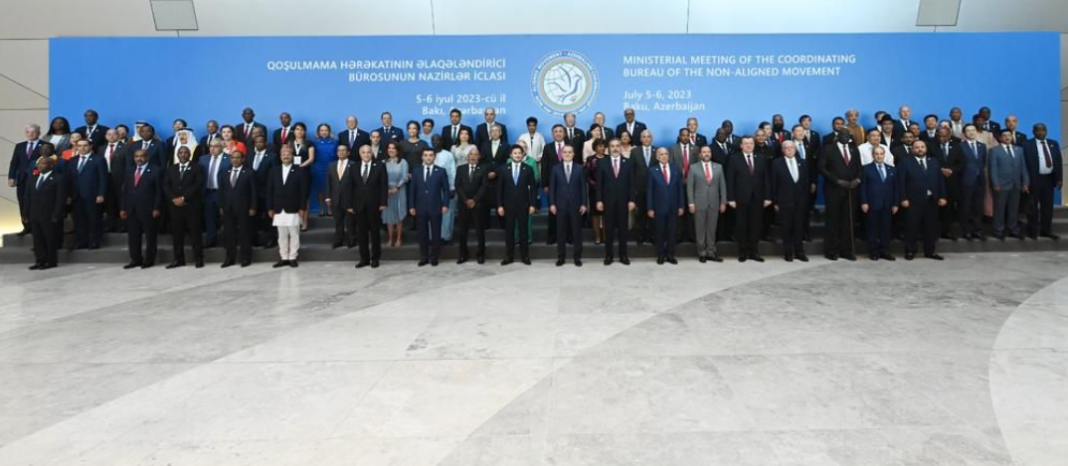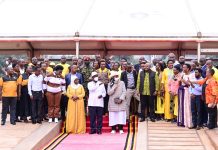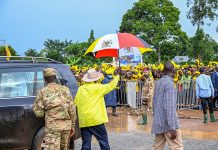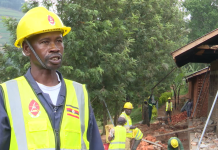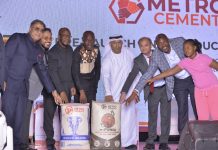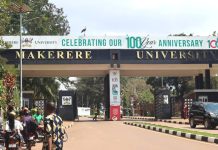In a momentous gathering of esteemed diplomats and leaders, the Ministerial Meeting of the NAM Coordination Bureau commenced in the vibrant city of Baku, Azerbaijan. Among the notable attendees, were Honorable General Odongo Jeje Abubakar, Minister of Foreign Affairs of Uganda. With a wealth of experience and deep insights, he addressed the assembly, shedding light on critical global challenges and Uganda’s unwavering commitment to unity, resilience, and progress. His comprehensive statement on these matters can be found below.
“H.E. Jeyhun Bayramov, Minister of Foreign Affairs of the Republic of Azerbaijan and Chair of the Ministerial Meeting of NAM Coordinating Bureau
Excellences Ministers and Heads of Delegation from Member States,
Representatives of Observer Countries,
Distinguished Delegates,
Ladies and Gentlemen
At the onset, I wish to extend my gratitude to the Government of Azerbaijan for hosting this important meeting and the generous hospitality extended to my delegation since our arrival in this scenic city.
I also wish to extend my country’s appreciation to the Government of Azerbaijan for the leadership of the Movement since the 18th Summit took place here in Baku. The leadership provided especially during the most challenging period of the COVID-19 pandemic was exemplary.
Excellencies,
NAM remains a vital pillar of support for developing countries shared quest for peace, security, development, and justice in international relations. As you are aware, Uganda will host the 19th Summit of the Non-Aligned Movement (NAM) on 15-20 January 2024 and to assume the Chairmanship. We have therefore defined our vision during the forthcoming chairmanship, namely: “A stronger and united NAM that contributes to a better world for all”.
I am pleased, therefore, that the theme chosen for our interaction during this Ministerial meeting of the Coordinating Bureau, speaks to, and reflects the spirit of our vision for the next three years. Our Movement, the Non-Aligned Movement, was founded on the pillars of unity and solidarity, to address the challenges of the time, notably the cold war and colonialism.
Sixty-two years later, some of these challenges were addressed, but others remain. For example, we still have territories for selfdetermination. Concurrently, we are grappling with a number of emerging challenges, which call for our united and steadfast resolve to address.
Excellences,
Terrorism continues to be one of the current major threats to international peace and security and development, and requires our ongoing effort to address, in all its forms and manifestations.
On behalf of the Government and people of Uganda, I convey our appreciation to all Member States, within NAM and beyond, that extended condolences and sympathies to Uganda upon the killing of Uganda troops serving with the African Transition Mission in Somalia (ATMIS) on the hands of Al-Shabaab, on 26th May, 2023.
We have also received many messages of support following the killing of innocent students of Lhubiriha Secondary School in Kasese District, Western Uganda, by elements linked to the Allied Democratic Forces, which happened on 16th June, 2023. We thank you for that solidarity and reaffirm Uganda’s commitment to the fight against terrorism and violent extremism in our country, in the region and beyond.
Our joint efforts towards preventing and curbing the financing mechanisms for terrorist groups and organizations; as well as identifying and closing recruitment platforms for terrorist groups, including ICT and media platforms, is critical. We also need to share information to facilitate prompt prosecution and punishment of convicted terrorists.
Excellencies,
The challenges of our time are diverse and multifaceted. In addition to terrorism, allow me to highlight the following four:
First, the continuing conflict in Ukraine has brought with it many negative effects. Economic hardship, characterized by: high oil and gas prices – resulting from embargos and sanctions imposed on Russian oil and gas; food insecurity – arising from shortages of grains and grain products (especially wheat); and rising global inflation, have continued to affect many of us within NAM.
Uganda calls for, and supports every effort that promotes dialogue and a peaceful settlement of this conflict. Indeed, on 16th – 19th June 2023, Uganda was part of the African Peace Initiative that visited Ukraine and Russia, as part of the international efforts to encourage dialogue and end the conflict. For whatever it is worth, such efforts and initiatives should be supported and given a chance.
Second, Uganda is concerned about the increasing role and use of mercenaries and mercenary groups in conflict situations. In addition to challenging established authority, these groups prolong conflicts and contribute to devastation of lives and property. As we discuss peace and security mechanism, this matter of hired guns and proliferating small and light weapons requires our attention.
Most importantly, we should continue to reaffirm the centrality of peaceful settlement of disputes, with a focus on addressing underlying causes of conflict. The continuing prevalence of conflict and wars testifies to the inadequacy of current efforts, and the need to do more. We should encourage and support, as much as possible, the concept of “regional solutions to regional problems” in the management and resolution of regional conflicts. Through this idea, priority should be given to national efforts, supported by the region. Where national and regional efforts fail, then the UN should be invited to provide the appropriate support.
Third, we are all aware of, and appreciate the enormous burden occasioned on our economies by the COVID-19 pandemic. Economic progress among many of our countries has been grossly affected, particularly among developing countries and small island developing countries.
As highlighted by the World Bank’s “World Development Report 2022”, the pandemic forced emerging and developing economies to exceed their already high sovereign debt levels. The average total debt burden among low and middle-income countries increased by roughly 9% of gross domestic product (GDP) during the first year of the pandemic, compared with an average annual increase of 1.9% over the previous decade. These are issues that require our concerted efforts, with support from the regional and multilateral financial system, to mitigate against these effects.
Fourth, conflict, socio-economic hardship and climate change have exacerbated the international migration problem, and the attendant humanitarian crises. No region is immune from forced migration in the form of refugees. For the case of Africa, not even the risk of drowning across the Mediterranean, or forced deportation, has deterred people from attempting to migrate.
Climate change has also brought enormous impacts. Frequent and heavy floods, landslides, prolonged droughts, wildfires, and rising sea levels have destroyed lives and property, and displaced people. These require enhanced cooperation and partnership, including dedicated and substantial resources for search, rescue and relief operations, as well as rehabilitation and reconstruction.
Unfortunately, resources from partners dedicated to addressing and supporting refugees and IDPs, have been reducing. Refugee Host countries and communities, such as Uganda, are coming under increasing pressure and constrained economies to support these humanitarian situations. NAM should play an active role in the international discourse on these matters.
Excellences,
In the spirit of the theme for our interaction, let us remain united and steadfast in confronting the above challenges, including those amplified by other delegations.
As I conclude my remarks, I look forward to welcoming you all in Kampala for the 19th Summit of the NAM Heads of State and Government. The preparations for the Summit are progressing well and I wish to take this opportunity to thank the members who have been generous enough to share their experiences and support us in the preparatory processes. “


